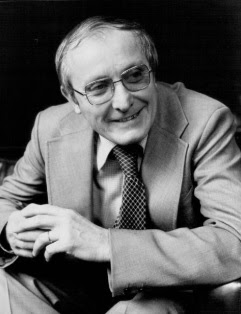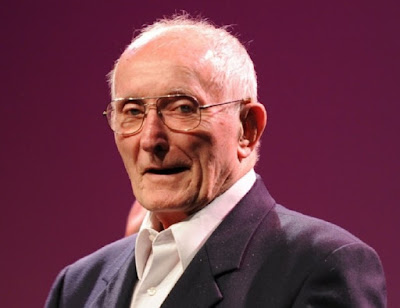Ward Lamar Swingle (September 21, 1927 – January 19, 2015) was an American vocalist and jazz musician and the founding father of the Swingle Singers, the a cappella group that blended jazz rhythms with baroque and classical music in a distinctive, easy-listening style.
 Ward Lemar Swingle was born on September 21 1927 in Mobile, Alabama, where, he once said, the sounds of New Orleans float along the coast of the Gulf of Mexico. He took to the piano from an early age and with his older brother, Ira, played lunchtime concerts in the school cafeteria, garnering sufficient popularity to be elected as president and vice-president respectively of their student council. By the time he left school Ward, Ira and one of their sisters, Nina, were touring with the Ted Fio Rito Orchestra.
Ward Lemar Swingle was born on September 21 1927 in Mobile, Alabama, where, he once said, the sounds of New Orleans float along the coast of the Gulf of Mexico. He took to the piano from an early age and with his older brother, Ira, played lunchtime concerts in the school cafeteria, garnering sufficient popularity to be elected as president and vice-president respectively of their student council. By the time he left school Ward, Ira and one of their sisters, Nina, were touring with the Ted Fio Rito Orchestra.He studied music at the Cincinnati Conservatory, where he met his future wife, a French-born violinist, , Françoise Demorest and won a Fulbright scholarship to pursue his musical studies in postwar Paris, taking lessons there with the celebrated pianist Walter Gieseking. Soon he was working as a rehearsal pianist for Roland Petit’s Ballet de Paris at a time whe n Petit was exploring jazz rhythms in his choreography.
Swingle’s first singing work – his voice was a mellifluous tenor - was with Blossom Dearie’s Les Blue Stars, a French vocal group whose members included Christiane Legrande, the sister of Michel Legrande, the composer. From there he joined Mimi Perrin’s Les Double Six, which won acclaim for its electronic treatment of jazz standards.
As Perrin’s health deteriorated in the early 1960s, Swingle, Legrande and other members of the group began singing privately, experimenting with jazzed-up Bach arrangements with the aim of improving their collective vocal agility. By 1962 the eight-member group was performing in public as Les Swingle Singers. Their
concerts proved to be great hits with audiences, especially in Britain, and their early recordings won five Grammy awards.
concerts proved to be great hits with audiences, especially in Britain, and their early recordings won five Grammy awards.
By the early 1970s Swingle felt that he had exhausted the repertoire possibilities with his Parisian singers. He also wanted to experiment with other techniques, including closed-mic singing. Crossing the Channel in 1973 he set up Swingle II, or the New Swingle Singers. The traditional swing music remained, but listeners were now regaled with jazz renditions from a wider selection of musical traditions, ranging from baroque to big band.
As well as looking forward, the Swingle Singers now also began looking into music’s back catalogue, releasing a disc of madrigals with a jazz twist in 1974.
As well as looking forward, the Swingle Singers now also began looking into music’s back catalogue, releasing a disc of madrigals with a jazz twist in 1974.
Britain proved to be fertile ground. There were invitations to music festivals around the country as well as plentiful radio work. In 1982, for example, the Swingle Singers appeared in a televised concert from St Paul’s Cathedral performing the sacred music of Duke Ellington with Tony Bennett, Phyllis Hyman and McHenry Boatwright.
After recording the Berio Sinfonia under the baton of Pierre Boulez in 1984, Ward Swingle stepped back from frontline singing to return to the United States. He remained the group’s musical adviser, while also running vocal workshops and publishing his many musical arrangements. He was often invited to share the
techniques that he had developed for the Swingle Singers with established groups, such as the Stockholm Chamber Choir and the BBC Northern Singers.
techniques that he had developed for the Swingle Singers with established groups, such as the Stockholm Chamber Choir and the BBC Northern Singers.
In March 1994, Swingle and his wife moved back to France, where he continued his work in arranging, composing and guest conducting. In 1997 he wrote an autobiography and treatise entitled Swingle Singing, in which he defined 'Swingle Singing' techniques with illustrations from his arrangements and compositions.
On February 20, 2004, Swingle was named "Officier de l'Ordre des Arts et des Lettres" (Officer of the Order of Arts and Letters) by the French Minister of Culture and Information.
Today the Swingle Singers, now a seven-member ensemble, continue to push the boundaries of vocal music while also making recordings for television programmes and films, including Sex and the City. Around 70 alumni keep in touch regularly, many of them gathering to celebrate Ward Swingle’s 80th birthday in 2007, when the Berio was heard once again at the Proms.
In December 2014 Ward and Françoise moved to England to live with their daughter Rebecca. Swingle died in his sleep at the age of 87 in Eastbourne, England, on 19 January 2015. Françoise Swingle died in 2017.
(Compiled and edited from Wikipedia & The Guardian)







